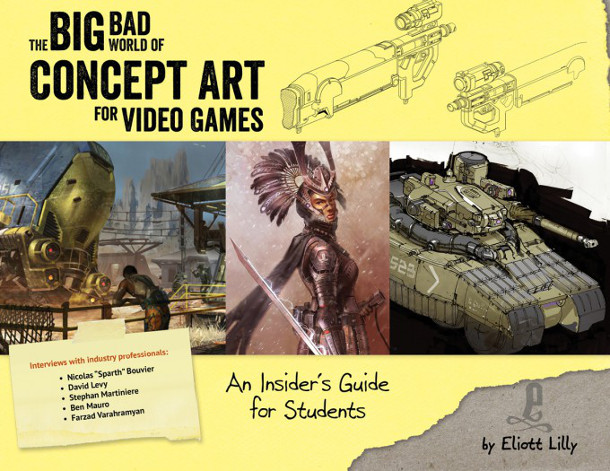10 questions to ask before you apply for an art job
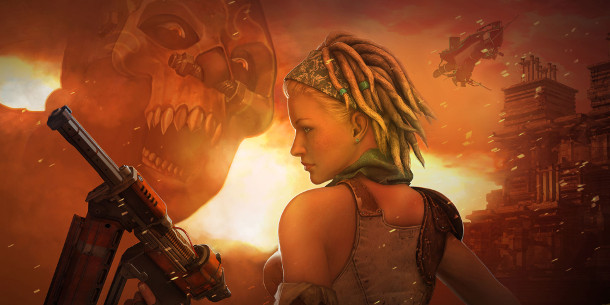
Building a successful career in the entertainment industry takes careful planning. Below, concept artist and author Eliott Lilly reveals 10 key questions you should ask yourself before applying for your first art job.
Even if you are just starting out in the CG industry, it’s never too early to start thinking about your career.
During your working life, you’re only going to be able to take part in a limited number of projects and work at a handful of studios. In addition, the projects you work on can directly affect your self-esteem and your level of happiness. Your time is precious, and you can’t afford to waste it on projects you don’t care about, or at studios you have no business working for. Navigating a successful career as an artist (I define ‘success’ as continued employment in the field of your choosing), will require ambition, laser focus and sometimes, bold action.
To help you on your journey, here are 10 questions you should ask yourself before you even apply for your first job. They’re tailored towards concept art, and particularly concept art for videogames, but the same basic principles apply to other art jobs, and to animation and visual effects as well as game development.
1. What are you really good at drawing?
Every artist has their favourite subject, but just because you draw something a lot doesn’t mean you can draw it professionally. You need an objective understanding of your own strengths and weaknesses as an artist. Get direct feedback from a trusted teacher or industry professional on what you still need to improve.
Similarly, athough the industry is booming, it is still relatively small. There are way more artists than jobs available, and as such, competition for these jobs is fierce. If you want to compete, you also need a firm understanding of what makes your work unique, and know the value you can bring to any project. This becomes your ‘mission statement’ that informs your decision-making process moving forward.

Serving the market: don’t assume that what you like drawing most is what you’re best at. Get objective feedback from teachers or working artists about the skills you can bring to a studio to guide your career decisions.
2. What are your long-term goals?
Once you understand who you are as an artist, figure out a long-term plan (what kind of studios you want to work for, which projects you want to work on, and so on). Create specific, tangible goals.
For example, tell yourself: “In five years, I want to become a senior character concept artist working at Blizzard studios on games like Warcraft.” Let your dream job be the target that you aspire to. Write the goal on a piece of paper, then hang it somewhere you can see it every day, as a constant reminder.
If you don’t know with 100% certainty what your dream job is, base your goal on your areas of interest. If you find that you are really passionate at drawing creatures, incorporate that into your long-term goals.
3. What’s your plan to achieve those goals?
With your goals identified, you need a plan to make them a reality. You will have to audit your career, assess how close you are to actually achieving your goals, then correct your course as needed. This can mean a shift in your thinking, trying a new tactic when looking for work, or changing your job search parameters all together. It may also mean you have to go back to the proverbial drawing board and rebuild your portfolio.
Take the time to write out your plan (break it down into practical steps) on the same piece of paper as your goals so you can refer to it regularly.
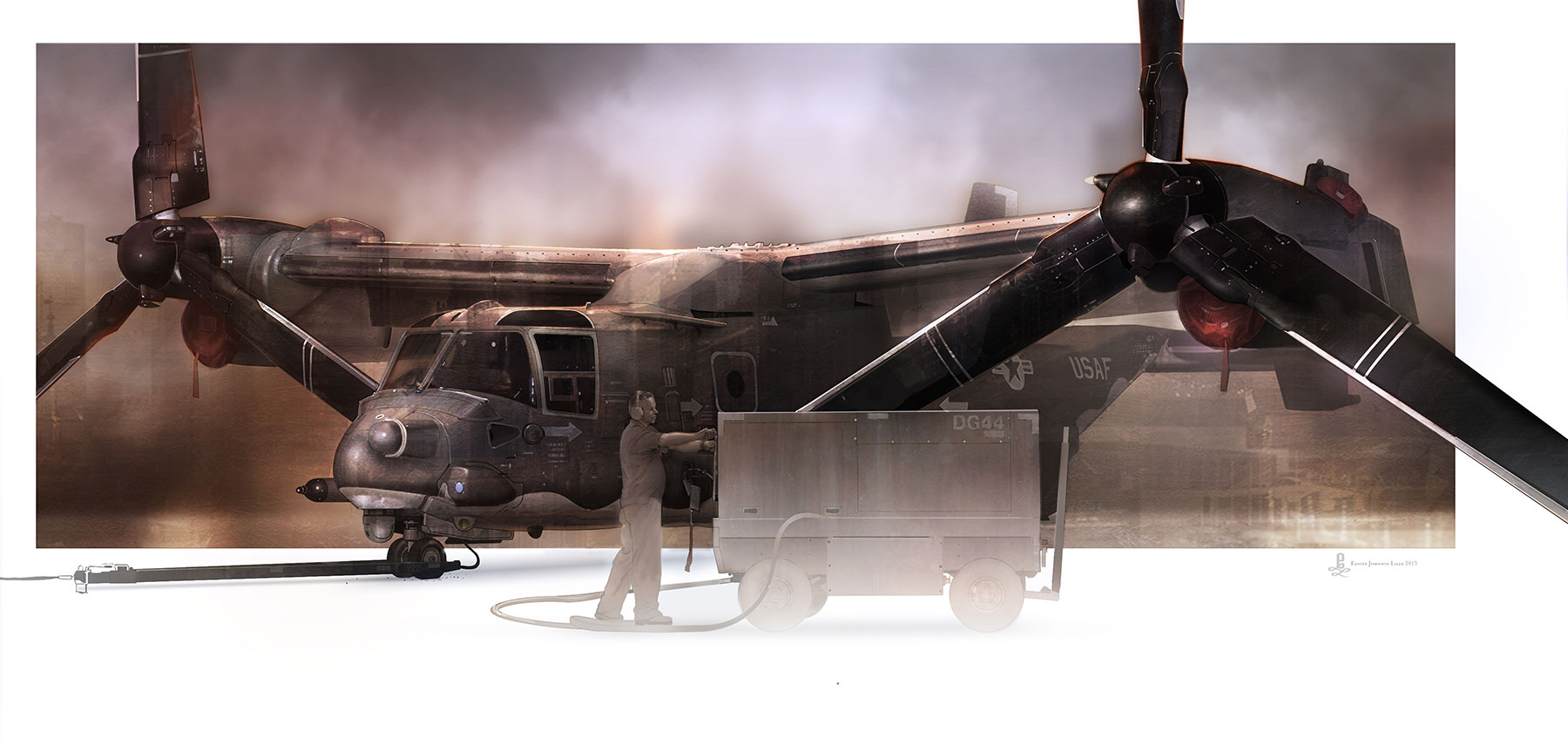
Specialist or generalist? Larger studios often need artists who specialise in a specific area of art, such as vehicle design, whereas smaller studios often prefer more rounded skill sets. Tailor your portfolio to reflect this.
4. Are you a specialist or a generalist?
You should be aware that when reviewing potential candidates, bigger videogame companies with larger teams tend to look for artists who specialise in one or two specific areas of concept art (characters, vehicles, and so on). On the other hand, smaller companies with limited staff may be more attracted to a generalist candidate who is well-rounded and can dabble in a bit of everything.
This is a bit of an over-generalisation, but the fact remains that to be attractive to a studio, your skill set must line up with their needs. Your portfolio content should convey that skill set so clearly that any studio can see both how your talents will benefit their project and how they would implement you into their production pipeline.
5. Does your portfolio mirror your plan?
At the end of your time at school, you will have amassed a large collection of class assignments – but putting them all into one book does not make it a portfolio.
Your portfolio should support your mission statement and your career goals. It should contain enough images to demonstrate what you want to be hired for, but nothing that you wouldn’t gladly do again. Play up your strengths and downplay your weaknesses and remember: you’re only as good as your worst image.
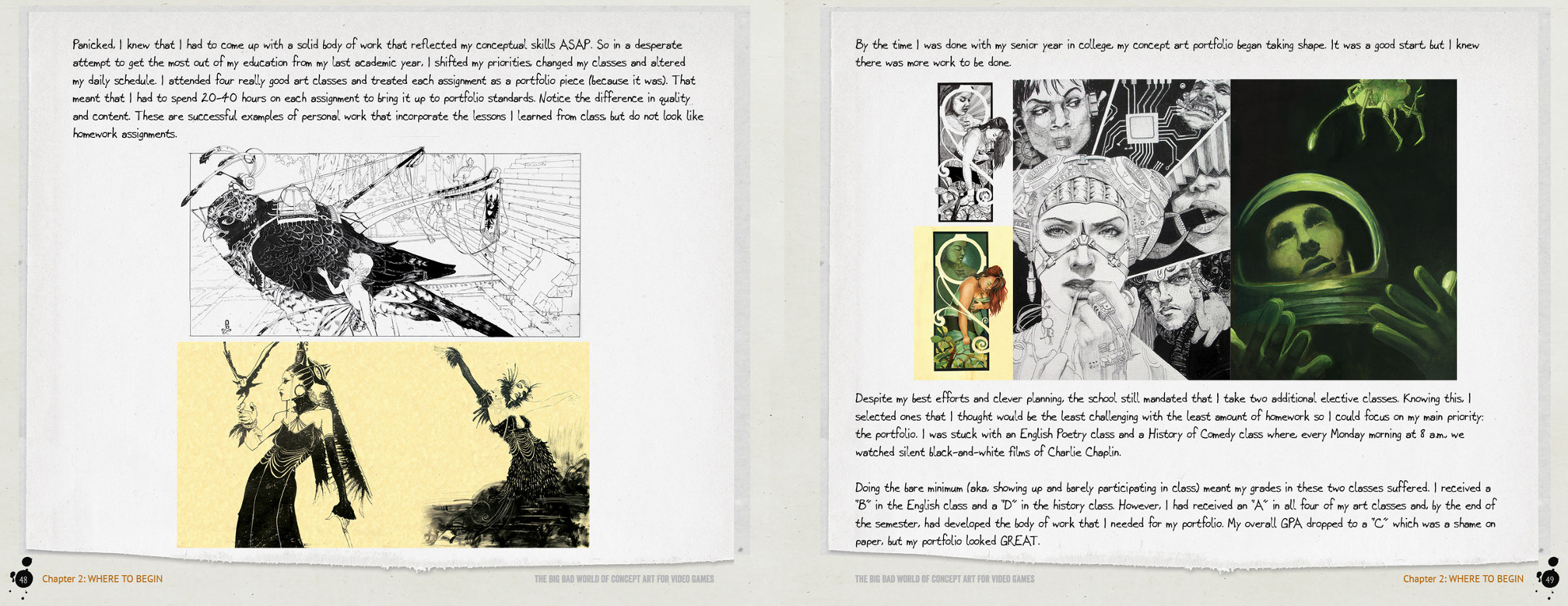
Don’t put all of your school assignments into your portfolio: ditch anything that doesn’t support your career goals. Eliott’s book, The Big Bad World of Concept Art For Video Games has more advice on how to do this.
6. Can you compete with the competition?
Evaluate established artists who do the same things you want to. Examine samples of their work side-by-side with your own, then honestly asses how yours holds up. Is the quality of your portfolio on the same level?
If the answer is “yes”, then you’ve passed the litmus test. Now that you’ve familiarised yourself with the competition, you can forget them. While you may be competing for the same jobs, there is no such thing as the “best artist”: everyone has their own strengths and weaknesses. The only person you should be in competition with is yourself – to be the best artist that you can be.
If the answer is “no”, then you aren’t ready for the industry – yet. Practise some more and try again in three to six months. By then you will have generated new, and hopefully improved, portfolio images.
7. Are your job-hunting expectations realistic?
A common mistake made by artists (especially ones with mediocre portfolios) is to set the bar too high. Wanting to go straight to the top of the industry, they often apply to the biggest and best studios, not realising that when you’re fresh out of school, with little to no experience, these studios might not even send you a rejection letter.
That’s not to say that you can’t get a job right out of college working at an AAA studio… but it’s uncommon. Everyone in the industry wants to work for them, and with so much talent to select from, they rarely choose recent graduates. Instead, consider applying to lesser-known and/or smaller studios first, to build up your experience.
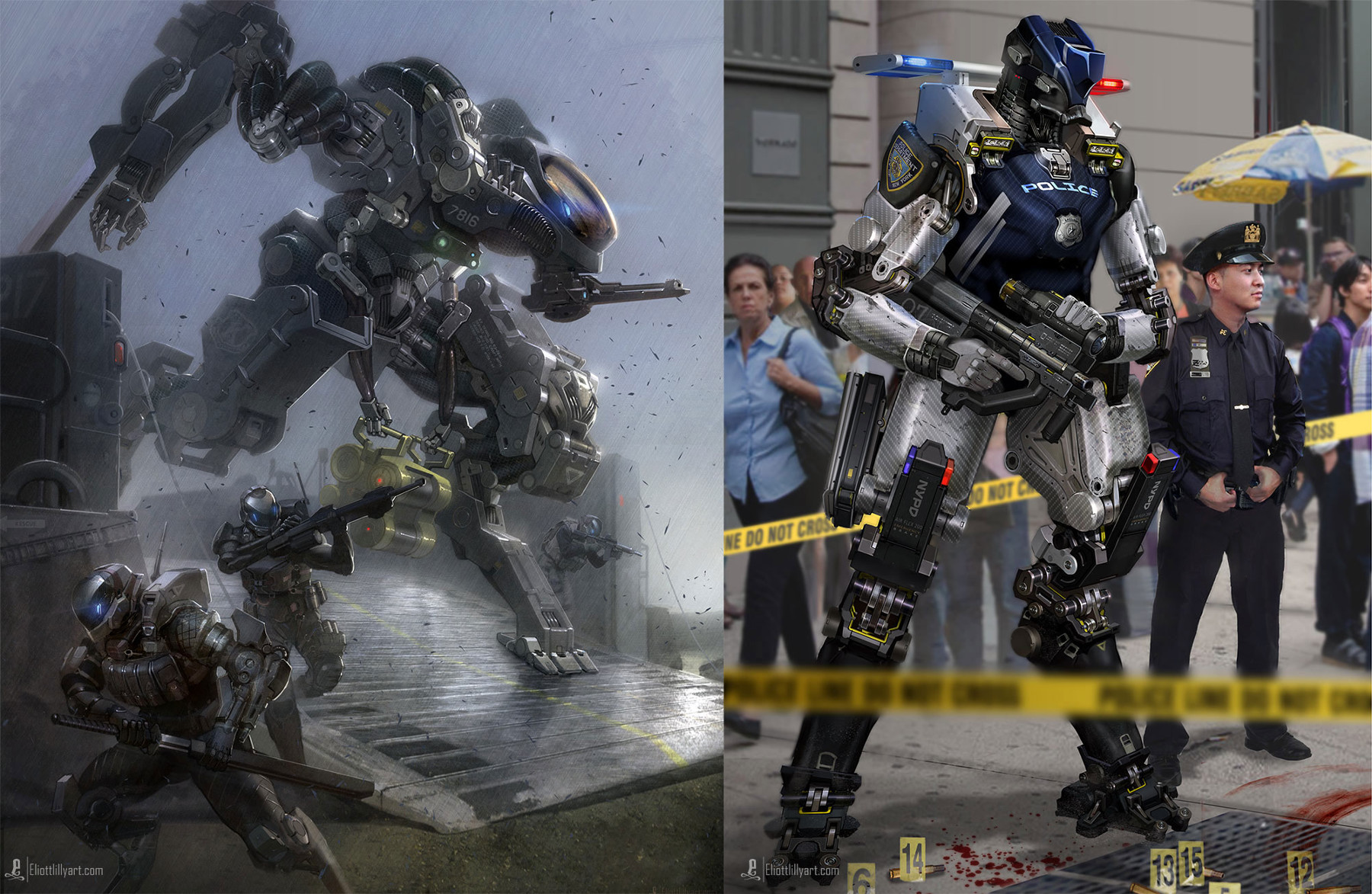
Choose your working environment carefully. Would you prefer to be working independently, with more creative freedom, as at a smaller studio – or in the kind of structured team environment that a larger studio can give you?
8. What are your priorities when choosing a studio?
When applying for your first job, it can be easy to overlook the fact that working for a company is a two-way street. Yes, you need them to like your work enough to want to hire you, but they also have an obligation to you, the employee. It is up to you to determine what kind of working environment you need to thrive. Things to consider:
- What is more important to you: working for a higher salary or to working on ‘cool’ projects?
- A big company may offer a higher salary and more benefits, but a smaller company may give you greater creative control over your work. Which would you choose?
- Do you care if you work for a first or third-party developer? How about an independent studio?
- Do you want to work alongside a team of junior artists? How important to you is finding a mentor on the job?
9. Will the studio you’ve chosen benefit your career?
When choosing a studio, keep in mind that besides lending your talents to a project, you are basically investing in that company. Your career becomes intertwined with its success. If a project does well, you are in a position to benefit. If a project does poorly or if the studio has layoffs, your career may suffer.
In job interviews, you may find that your skill set (and therefore, your perceived value) is directly proportional to the successes or failures of your last studio. Even if a project fails for reasons beyond your own control, those blemishes on your record will follow you. You need to be very selective when choosing an employer.
10. The bottom line: what is important to you?
Not all studios are created equal. Run through the questions you’ve already asked yourself, and decide what – beyond progressing towards your long-term goals – you hope to get out of your first job. Is it just a salary? An awesome body of work for your portfolio? Bragging rights? Chances are you won’t find all of these at your first gig, but if you spot at least one, you know that job has more value than the others available.
To sum up: although it’s tempting when you’re just starting out, don’t blindly apply to every studio that has a job listing. Taking the wrong job can lead to wasted effort and a useless body of work. So make the most of your time. Focus on the things that are important to you, and be sure that each job you apply for lines up with your long-term goals – or at least gets you close to them.
This has been a very brief guide to landing your first job in the entertainment industry, so for more information, check out my book, The Big Bad World of Concept Art for Video Games: An Insider’s Guide for Students. In it, I discuss in detail what the job of a concept artist really entails, how to choose the right education, what you should be studying and practising in school, how to build a portfolio to land the job you want, and much more.
 About the author: Eliott Lilly is a freelance concept artist, adjunct professor, and published author. He has worked in the videogame industry for nearly a decade, and recently worked with Treyarch on Call of Duty: Black Ops 3 as lead multiplayer weapons concept artist. He regularly publishes careers advice and links to tutorials on his blog, while you can see his own art at eliottlillyart.com
About the author: Eliott Lilly is a freelance concept artist, adjunct professor, and published author. He has worked in the videogame industry for nearly a decade, and recently worked with Treyarch on Call of Duty: Black Ops 3 as lead multiplayer weapons concept artist. He regularly publishes careers advice and links to tutorials on his blog, while you can see his own art at eliottlillyart.com

